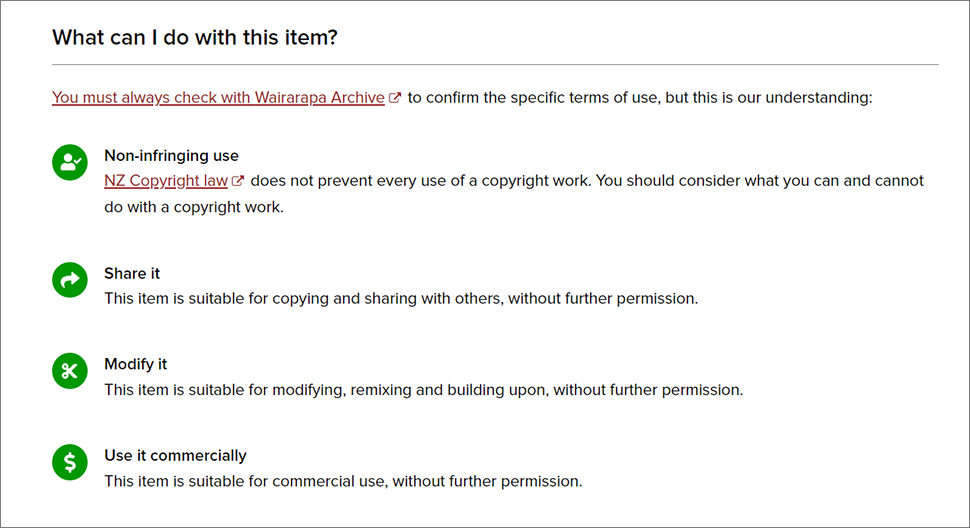Reusing items on DigitalNZ and copyright
This copyright guide helps visitors to DigitalNZ understand what they can and cannot do with content found through this website.
What is copyright?
Copyright is a legal right that gives creators control over an original work (or item) they have created for a fixed period of time (the length of time depends on circumstances such as when it was created and what type of work it is). Copyright protects creators from people copying, sharing, or performing their works without permission.
Typically, creators own the copyright to a work they have created and they are able to grant permission for the use of their work. In some situations fees or royalties can be charged for the use of a work.
What can I do with items I find on DigitalNZ?
Information about the use of an item in DigitalNZ can be found on each record page under the headings ‘What is the copyright status of this item?’ and ‘What can I do with this item?’

What can I do with this item? Information about using the item Fernridge School pupils : Photograph from Wairarapa Archive.
Before reusing any item found through DigitalNZ, check the terms of use and the copyright statement of the item to find out:
if you can copy and share the item
if you can modify or change the item
or if you can use the item commercially.
Please note: DigitalNZ displays copyright information related to collection items directly from the content partner which may not be accurate or up to date. Always check with them to confirm the specific terms of use.
Cultural considerations
Digital content that depicts people, objects, and subjects can have significant cultural importance to Māori, Pacific, and other communities. It is important to seek further consultation and permission from the creator/s or originating iwi, hapū or whānau before copying and distributing this content, alongside the copyright status.
How can I find items for reuse on DigitalNZ?
To help find material that may be suitable for reuse, the ‘Usage’ filter provides a general guide. After performing a search, select one of the filters (such as Share, Modify, Use Commercially) to show objects from your results that may be suitable for your purposes.

Unknown
There are many items from content partners where the usage rights are unknown. It may be that ‘Unknown’ material is suitable for sharing, modification, and commercial use but you will need to check the item’s specific terms of use, and may need to undertake research to find the creator and publisher to determine this.
All rights reserved
These results may only be suitable for the purpose of ‘fair dealing’ under the Copyright Act, unless permission is granted by the creator or copyright owner. You can examine the licence/copyright status of each object on the content partner’s web page to determine how to ask permission. Note: ‘All rights reserved’ items are often not permitted to be reused, shared, or republished.
Share
Filter by ‘Share’ to show results that may be suitable for copying and sharing with others in some way, without further permission. You normally need to credit the creator or owner, and you should always check the content partner's website to confirm the specific terms of use.
Modify
Filter by ‘Modify’ to show results that may be suitable for modifying, remixing and building upon, without further permission. You normally need to credit the creator or owner, and you should always check the content partner's website to confirm the specific terms of use.
Use commercially
Filter by ‘Use commercially’ to show results that may be suitable for commercial use, without further permission. You normally need to credit the creator or owner, and you should always check the content partner’s website to confirm the specific terms of use.
What is the Public Domain?
In most cases (exceptions can include privacy, indecency etc), a work enters the Public Domain once the copyright expires. At this point, permission or authorisation to copy, adapt, or distribute the work is no longer needed.
When reusing works in the Public Domain, consider the following principles.
Cultural sensitivity. If the work includes culturally sensitive elements you should not change or use these in ways that might be derogatory to other cultures or communities.
Attribute the source. Credit both the author/creator and the organisation who holds the work (eg. archive, museum).
Share knowledge. Contact the organisation who holds the work when using public domain works to create new content, or if you have additional information about the work such as its origins, authorship, or related rights holders.
Respect the original. Clearly indicate any modifications made to the original work when redistributing it.
Preserve Public Domain status. Do not remove Public Domain marks or notices, and ensure accuracy in conveying the work's copyright status.
Source: Europeana Public Domain Usage Guidelines
Are there any exceptions to copyright?
Most copyright laws have exceptions that allow copyright or use of a work for specific purposes. The most common exceptions are rules that allow the ‘fair dealing’ of a work, for example for private research, study, criticism, review, or news reporting.
Copyright Licensing New Zealand fact sheet: Fair dealing in New Zealand
Ministry of Education TKI: Guideline for copyright in schools
Thank you for respecting copyright in collection items found on DigitalNZ.
Disclaimer: We believe the information in this guide on this page is accurate, but it does not constitute legal advice and DigitalNZ is not responsible for loss or damage caused as a result of following it.